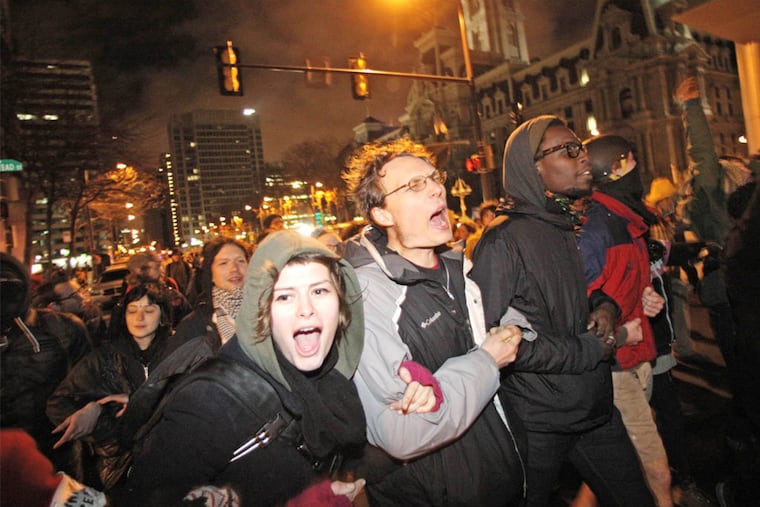City settles Occupy Phila. suit for $200,000
More than four years after Philadelphia police arrested dozens of Occupy Philadelphia protesters, the city has agreed to pay $200,000 to settle claims that officers violated demonstrators' civil rights.

More than four years after Philadelphia police arrested dozens of Occupy Philadelphia protesters, the city has agreed to pay $200,000 to settle claims that officers violated demonstrators' civil rights.
The settlement was reached last week. Attorneys are waiting for all 25 plaintiffs to sign off on the deal before it is final.
"We feel very strongly that the First Amendment rights of Occupy protesters on the night of the eviction have been vindicated through this settlement," said Paul Hetznecker, one of the attorneys for the protesters.
The city admits no wrongdoing in the settlement, said Craig Straw, first deputy city solicitor. "We think we have a good agreement," he said.
The settlement comes as Philadelphia prepares for protests expected during the Democratic National Convention in July.
The Occupy protest was a weeks-long event that started in October 2011 with people camping outside City Hall to draw attention to income inequality.
After a seven-week encampment, Mayor Michael Nutter said the site needed to be cleared for a scheduled $50 million renovation of Dilworth Plaza. More than 50 protesters were arrested on Nov. 30 after they marched north on Broad Street. All were acquitted.
Some of those protesters then sued the city in federal court, contending police violated their rights to free speech and assembly by arresting them without probable cause.
Toorjo Ghose, an assistant professor of social work at the University of Pennsylvania, is among the protesters who will receive a portion of the settlement. "I would like the mayor and Police Department to take note," Ghose said. "$200,000 is a lot of money and it doesn't come out of the mayor's salary. It's coming from the city coffers . . . taxpayer money. That is not something that should continue."
Of the 25 plaintiffs, 17 who went to trial will receive $10,000 each, according to Lawrence S. Krasner, another lawyer who represented the protesters. Seven who were arrested but not tried will receive $4,000 each, he said. One person, "whose participation was minimal," will receive a few hundred dollars, Krasner said.
Ghose said he "absolutely" plans to protest during the DNC, and hopes that interactions with police will be different than they were during Occupy.
Straw said the settlement was just a monetary action and that there is no order for police to do anything differently in the future. "There is no impact on procedure," he said.
Police Commissioner Richard Ross, who took the helm of the department in January and was not part of the lawsuit, said police will not intervene in protests during the DNC "as long as there is no lawlessness."
"We respect the rights of protesters, we truly do, as long as it doesn't get violent," Ross said.
Some of the Occupy protesters said they weren't sure things would be different in July.
"I wish I could be optimistic about this, but I don't believe the settlement will have any impact whatsoever on law enforcement behavior during the DNC," said Dustin Slaughter, a freelance journalist who was arrested in 2011 and who was one of the plaintiffs in the federal lawsuit. "Past nominating conventions have had insurance policies that specifically indemnify law enforcement. I see no reason why July would be an exception to that rule."
215-854-5520@InqCVargas